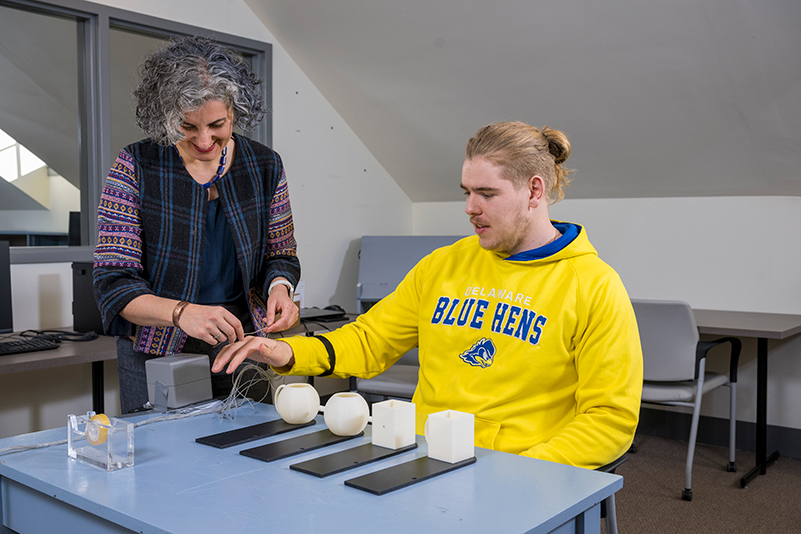
Cognitive Psychology Concentration
Welcome to the cognitive psychology graduate program, offered by the Department of Psychological & Brain Sciences at the University of Delaware. Our primary goal is to train a new generation of theoretically focused scientists to understand the mind and brain.
Our apprenticeship program is designed to rapidly engage new students. During their first semesters, students begin conducting research and consulting with their advisors to select courses that complement their research interests. Throughout the year students choose among a number of colloquia offered by the Department of Psychological and Brain Sciences. Readings are drawn from a variety of areas (courses, cognitive area seminar, independent reading) that help them to prepare for the qualifying exam.
We provide exciting opportunities for training in research with a number of different populations (including brain-damaged adults, infants, and children) and a range of state-of-the-art techniques. The Center for Biomedical and Brain Imaging houses a 3T Siemens Prisma scanner, and we provide extensive training in neuroimaging, including fMRI, DTI, MVPA, and other analysis techniques. We also provide training in EEG, brain stimulation (TMS), eye tracking, computational modeling, and behavioral experiments.
UD's Early Learning Center provides on-campus opportunities for research on cognitive development. We encourage collaborative, interdisciplinary research, so our students can obtain the kind of broad training that is required in today’s research environment.
Along with methodological expertise, students develop a strong theoretical foundation in understanding cognitive processes. Students develop these skills via formal coursework in statistics, methods, and special topics in cognition.
Our students will also receive training in teaching, provided in the form of teaching assistantships and courses on best practices in teaching.
Nature and goals of the program
This apprenticeship program in cognitive psychology for University of Delaware graduate students is designed to rapidly engage new students in research. Students begin conducting research their first semester. The number of required courses/seminars is minimal allowing the student in consultation with his/her advisor to select whatever additional courses would be most valuable to that student’s research interests. For breadth in the field, our students attend a weekly cognitive area seminar at which faculty and graduate students present their research and discuss current topics in the field. Throughout the year students can choose among a number of colloquia offered by the Department of Psychological and Brain Sciences. In addition, during their first two years, students’ readings are drawn from a variety of areas (courses, cognitive area seminar, independent reading) that will help them to prepare for the qualifying exam.
Collaborations
Our labs tackle core aspects of information-processing, such as scene representation, body representation, language, attention, emotion, learning, and categorization. Many of our faculty have expertise in spatial cognition: how we think about, navigate and perceive the world around us. Given that our faculty have complementary strengths, we strongly encourage bridge-building between labs.
Cognitive students collaborate freely with researchers not only from the Department of Psychological and Brain Sciences, but also from Linguistics, Education, and Philosophy. Developmental research is enhanced by strong ties to the Early Learning Center and the Cognitive Science Program in Linguistics. Neuropsychological and brain stimulation research is enhanced by collaborations with the Delaware Rehabilitation Institute and faculty in the College of Health Sciences.
Our faculty also have active collaborations with labs at Johns Hopkins University, the University of Nebraska-Lincoln, the University of Nevada-Reno, and the University of Pennsylvania.
Research with faculty mentors
Psychological and Brain Sciences faculty have been awarded APA and APS Fellowships and have been appointed as editors or editorial board members of journals such as Attention, Perception & Psychophysics, Child Development, Journal of Experimental Psychology: General, Psychological Science, Psychology and Aging, and Psychonomic Bulletin & Review. Faculty research has been featured in The New York Times, The Economist, The Guardian, Parents Magazine, CNN, and Discovery Channel.
Funding
Our faculty are currently funded by the National Science Foundation and the National Institutes of Health. This includes grants using functional neuroimaging to understand dyslexia, robotics to assess visuoproprioceptive integration in brain-damaged individuals, and a new NSF grant to create a post-baccalaureate BRIDGE program in data science and psychology for underrepresented students.
Work with our faculty
Visit each researcher's bio page, linked below, for information on research interests and current funding.
Faculty accepting graduate students for 2025–2026:


